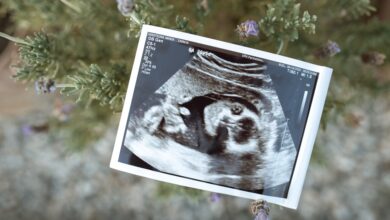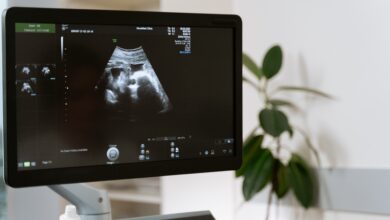
The condition of the 2 month fetus
At 7 SA, the embryo measures 7 mm. Organogenesis continues with the establishment of all its organs: the brain, the stomach, the intestine, the liver, the kidneys and the bladder. The heart doubles in size so that it forms a small protuberance on the abdomen. The embryonic tail disappears, the spine comes into place with vertebrae around the spinal cord. On the face of the fetus at 2 months , its future sensory organs take shape, the dental buds settle. The arms and legs lengthen, the future hands and feet take shape, followed by fingers and toes. Primitive sex cells also take place.
At 9 SA , the embryo begins to move in its bubble filled with amniotic fluid . These are still reflex movements, visible on ultrasound but imperceptible for the future mother who is 2 months pregnant .
At the end of this 2nd month of pregnancy, ie 10 weeks of amenorrhea (SA) , the embryo weighs 11 g and measures 3 cm. He now has human form with a head, limbs. The outline of all its organs is formed and its nervous system is being structured. You can hear his body beating on Doppler. Embryogenesis is complete: the embryo becomes a fetus at 2 months of pregnancy .
The belly at 2 months of pregnancy is not yet visible, even if the future mother begins to feel that she is pregnant due to the various symptoms.
Changes in the 2 month pregnant mom
The mother’s body undergoes intense physiological transformations: the blood flow increases, the uterus continues to take on volume and the hormonal impregnation is accentuated. Under the effect of the hCG hormone, which then reaches its maximum level at 2 months of pregnancy , the ailments increase:
- nausea sometimes accompanied by vomiting
- drowsiness
- irritability
- a tense and tender chest, darker areolas with small tubercles
- frequent urination
- hypersalivation
- tightness in the lower abdomen at the start of pregnancy , due to the uterus which is now the size of an orange, may intensify.
Physiological changes can cause new pregnancy ailments to appear:
- constipation
- heartburn
- a feeling of bloating, spasms
- a feeling of heavy legs
- mild discomfort due to hypoglycemia or low blood pressure
- tingling in the hands
- shortness of breath
Pregnancy is also taking place psychologically, which is not without arousing certain fears and concerns in the future mother, especially since in the second month, the pregnancy is still considered fragile.
- bridge
- Allergies (overview)
- Achluophobia : all about the fear of the dark
- At what age can you do bodybuilding?
- Fatigue in the morning: causes and remedies
Things to do or prepare
- Make your first mandatory prenatal visit to a gynecologist or midwife
- perform the blood tests (determination of blood group, rubella serology, toxoplasmosis, HIV, syphilis, search for irregular agglutinins) and urine tests (search for glycosuria and albuminuria) prescribed during the visit
- send the declaration of pregnancy (“First prenatal medical examination”) issued during the visit to the various organizations.
- make an appointment for the first ultrasound (between 11 weeks and 13 weeks + 6 days)
- compile a pregnancy file containing all the test results
- start thinking about where you were born
Advice
- The watchword of this 2nd month of pregnancy : rest. At this stage, it is still fragile, so any overwork or major effort should be avoided.
- in the event of bleeding, and/or severe pain or severe tightness in the lower abdomen during the start of pregnancy , consult without delay. It is not necessarily a miscarriage but it is important to check it.
- in full organogenesis, the fetus at 2 months is very fragile. It is therefore advisable to avoid viruses, microbes and parasites potentially dangerous for him (rubella, listeriosis, toxoplasmosis, etc.).
- throughout pregnancy, self-medication should be avoided because certain drug molecules can harm the foetus. To treat the inconvenience of the first trimester, seek advice from your pharmacist, gynecologist or midwife.
- alternative medicine is an interesting resource against these ailments. Homeopathy is safe for the fetus, but for optimum effectiveness, the drugs must be chosen carefully. Phytotherapy is another interesting resource, but it should be handled with care. Seek advice from a specialist.
- without going on a diet or eating for two, it is important to adopt a balanced diet. This also makes it possible to limit certain pregnancy ailments (constipation, nausea, hypoglycemia).
2 months pregnant, what diet?
The first reflex at 2 months of pregnancy is to stay well hydrated by drinking 1.5 L of water daily. This prevents digestive discomfort related to pregnancy such as constipation, which can cause the appearance of hemorrhoids, and nausea. Regarding the latter, an empty stomach will accentuate the feelings of nausea. To reduce nausea and avoid taking potentially harmful drugs for the 2-month-old fetus , the expectant mother can drink ginger or chamomile teas. The stomach aches of the 2 months pregnant woman are more or less frequent according to each one. Natural solutions exist for each of them.
As for food, it is recommended that it be healthy and of good quality. The future baby needs nutrients to develop properly. In this 2nd month of pregnancy, folic acid (or vitamin B 9) is very important for the production of the nervous system and the genetic material of the embryo. It is mainly found in green vegetables (beans, romaine lettuce or watercress), legumes (split peas, lentils, chickpeas) and certain fruits such as oranges or melon. Throughout pregnancy, it is important to avoid deficiencies with possible serious consequences for the foetus. The doctor can prescribe folic acid supplementation to the pregnant woman if she has a deficiency. Often, it is even prescribed as soon as you want to become pregnant, so that the future mother has enough vitamin B 9 when she becomes pregnant.










